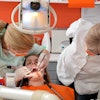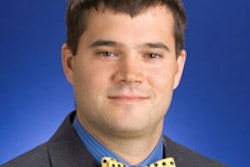
Dental students should polish their people skills if they want to land a plum associate's position after graduation, according to a study in the Journal of the American Dental Association.
In their survey of 574 dentists, researchers from Case Western Reserve University found that personality was the most important factor influencing the dentists' choice of a dental associate.
The survey questionnaire asked the dentists specifics about their practice, their preferred strategy for paying associates, and the characteristics they find most desirable in an associate.
"Though respondents did indicate their preferences with regard to training and experience level of new associates, these characteristics do not appear to be as important as a new associate's ability to integrate himself or herself into the practice," the authors noted (JADA, July 2008, Vol. 139:7, pp. 973-979).
Respondents were asked to rank 10 factors based on how influential each would be in guiding their choice of associate (1 being "most important"). Personality had a mean rank of 1.6, followed by years of experience (3.7) and completion of general practice residency/advanced education in a general dentistry program (4.8).
In a separate question asking how many years of experience the dentists would want in an associate, the top response was "no experience necessary."
"Considering the small size of many private dental practices and the intimate working relationships involved, it seems logical that effective relationships would be highly important to dentists interested in expanding their staff," the authors wrote.
So what personality traits are dentists looking for?
The most coveted quality is an associate's ability to interact with patients. A good relationship with the principal dentist is next, followed by the ability to interact well with the rest of the staff.
And how much compensation can the associates expect?
"The results of our study indicate that the majority of new associates would be offered less than $100,000 annually in salary, or would receive 30% to 40% of the practice's net/gross income as their compensation," the authors wrote. "We believe that new associates should assess compensation packages in terms of both the cost of living in that location and the total value before accepting an offer."
Of the 574 dentists surveyed, 316 said they would pay their associates a percentage of net/gross income, 138 chose a combination of salary and percentage of net/gross income, while 74 respondents indicated that they would prefer to pay their associate a straight salary.
The authors also found various motivating factors in a dentist's decision to hire an associate. More than 50% of the survey respondents said they were looking to hire someone so they could work fewer hours, 38% said they were looking to increase their patient load, and 36% said they were interested in training someone to take over the practice.
"This suggests that respondents' expectations with regard to associates' long-term commitment vary," the authors noted. "Similarly, dentists' responses varied considerably regarding the degree of supervision they intended to provide and the years of experience they were looking for in potential associates. For new job-seeking dentists, it seems prudent to clarify these expectations with the principal dentist during the interviewing process, as a misunderstanding could lead to an unhappy working relationship," they advised.



















